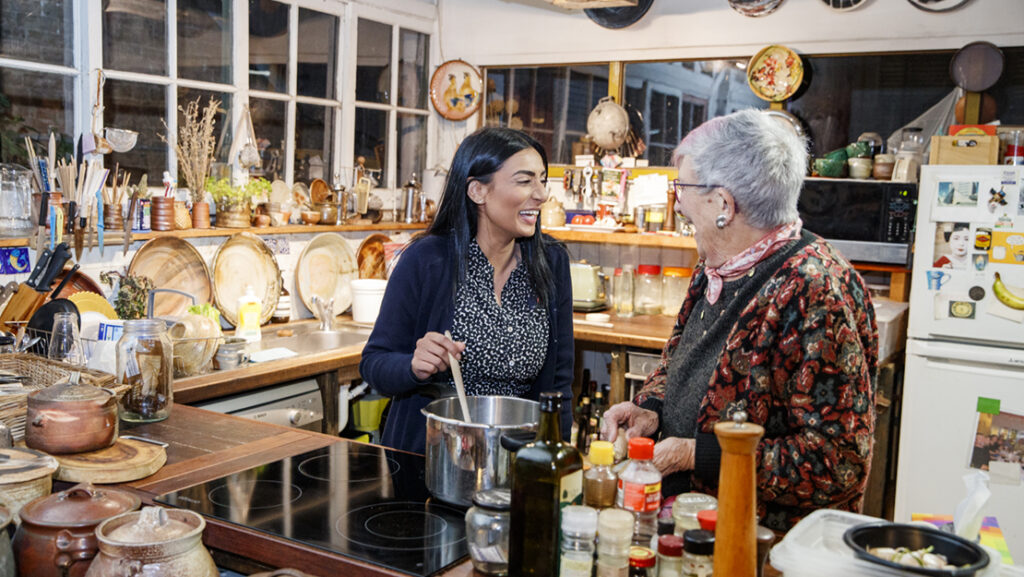Living the Life You Want

For the last 120 years, The Salvation Army has been providing aged care in Australia. We've delved into Community Care - one of the services delivered by The Salvation Army Aged Care.
General Manager of Community Care, Fiona Sanders, shared her insight and thoughts on why this service is particularly important in our society today.
What is Community Care?
When we think about Community Care, we commonly think about home care which means providing services to people in their own homes. I think the key thing is that as people get older, normal tasks of daily living become more difficult. But the challenge is that they don't want to give up their independence by having somebody else come into their home and do tasks for them.
What are some misunderstandings around Community Care?
The process of being assessed through the Aged Care Assessment Team (ACAT) for possible eligibility for funding can be daunting for people. Because they're worried that by being assessed, they will expose their vulnerability and be taken out of their own homes. But the idea of Community Care is keeping people at home. It's all about maintaining people's independence and their ability to make independent choices. It's about living the life you want, while receiving the care you need. So what we're here to do is to support you to keep living the life you want to live at home.
Why is Community Care an important service?
What I love most about Community Care is people being able to age in a familiar environment and feeling like they've still got control over how they live their life. I think that's the most important thing about us being able to deliver services to people in their homes. Keeping them at home and enabling them to make decisions about how they want to live their life - like making the call on when they want to eat or when they want to shop.
What is our point of difference?
I think what's really nice about an organisation like us is that we develop a relationship with the people that we care for. So it's not just us sending somebody in to clean a house, cook a meal, do the shopping or hang the washing on the line. It's about developing a relationship so that they look forward to the person coming to visit them at home. We also try to match carers. So we try to develop a story board about the people we are looking after so that we can make a meaningful connection with their life - that being their previous life and their current life.
Who can benefit from Community Care?
Someone who lives on their own and may not have family living in the same town. They might have children living interstate. So they don't have immediate support. But having a Home Care Package or being eligible for funding through the Commonwealth Home Support Programme gives them access to the support that they might've had if their family was available. We also provide care for quite a few people that still have their spouse and we offer support for them both.
Is there a growing demand for Community Care?
Oh yes, it's huge. There's been reports in the media about the decline of people going into aged care and an increase of services being delivered at home. There's certainly more people getting Home Care Packages and there's funding available to support people in their own homes. It's just that the process to access the funding can be quite convoluted.
How can people access funding?
If you don't know who to go to for help, we'll help you. One of the services we're more than happy to provide, is to help people navigate the aged care system. We can try to help speed up the process of being assessed, find out what funding you're eligible for and help you go through that process. Basically, we'll help you navigate through the fog and do everything we can so you can
receive the services that you want at home. And we don't charge for that.
When should people start exploring their options in Community Care?
You need to get the ball rolling before care is needed. As people age, they will need help for some aspect of their daily life. There's no point in waiting until your
mother or father can no longer dress themselves. You really need to sit down with them, which is exactly what I did with my folks, and explain that it doesn't matter if they're not ready to receive services. It can take three to four months to get the assessment and then it can take a month or two to get the report back saying you're eligible. Then it can take 18 months before you're allocated a package. So that's a two-year process. It's worth noting that the package can be parked if it's not needed at that time. It's better to start the conversation and go through the process, before the need arises.
For more information on Community Care, contact our Client Services team on 1300 111 227 and ask to speak to a Community Care representative, email us on agedcare.enquiries@salvationarmy.org.au
or visit our website www.agedcare.salvos.org.au.


